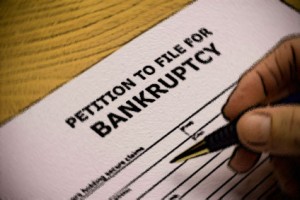Niches That Bring Your Riches: Purchasing Property From Estate Filing Bankruptcy

I am currently doing a series on my blog covering a little about each of the types of niches you could consider when investing in real estate. Go here to go to the beginning of this series.
Purchasing property from a bankrupt estate can be a road to long-term gain. The process takes firm resolve and a large measure of patience.
However, today the number of bankruptcies is staggering. Therefore the pot is full of leads. Look at these numbers ….there was 1,367,006 bankruptcy filings in just the past 12 months and another 1,641,127 in pending status.
- What is Chapter 13 Bankruptcy?
Definition: The reorganization bankruptcy for consumers, in which they partially or fully repay your debts. In Chapter 13 bankruptcy, they keep their property and use their income to pay all or a portion of the debts over three to five years. The minimum amount they must pay is roughly equal to the value of their nonexempt property. In addition, they must pledge their disposable net income — after subtracting reasonable expenses — for the period during which they are making payments. At the end of the three-to five-year period, the balance of what they owe on most debts is erased.
This is an alternative if their financial situation has improved so that you have found a way to continue making payments. Filing bankruptcy prior to a foreclosure auction will stop or at least put off the public sale of real estate. Unfortunately for most people, it only postpones the sale for a couple of months. Immediately after filing a Chapter 13 Bankruptcy, they will have to file a repayment plan with the courts. This plan has to show that they have sufficient monthly income to pay basic living expenses such as food and utilities and other monthly payments such as credit cards, car payments etc. In addition, their income must be sufficient to resume making your monthly mortgage payments. All past due amounts are usually spread out between 24 and 60 months. For example, if they owe $9,000 in missed payments, attorneys fees, etc. if spread out over 48 months would be an additional $187.50 due each month to the court appointed trustee.
Keep This In Mind:
Over the years, I’ve spoken with many individuals who filed for bankruptcy protection only to have their cases dismissed. Not only were they out their attorney’s fees (usually $1,000 – $2,000) but now had a bankruptcy and foreclosure on their credit report. Bankruptcy should be considered an action of last resort.
Secured debt survives
The bankruptcy discharge eliminates your personal liability for the mortgage, but it does not disturb the lien. Thus, after bankruptcy, the mortgage lender still has its rights in the property, including the right to foreclose if the loan agreement is breached.
Unfortunately Chapter 13 bankruptcy only delays the foreclosure and most homeowners have the same shortage of cash they had before the bankruptcy.
Sellers realize that they are out of options and MUST sell their house.
- What is Chapter 7 Bankruptcy and how is it different than Chapter 13?
Chapter 7 Bankruptcy is a complete liquidation of assets and debts. With few exceptions, all debts and contractual obligations are wiped out in Chapter 7 Bankruptcy. However, all assets may be subject to liquidation and sale. There are some exemptions in bankruptcy; that is, some items that you cannot lose in bankruptcy. These items are set forth in 11 United State Code Section 522: - Real property, including co-op or mobile home, to $15,000 Disability
- Illness or unemployment benefits
- Life insurance payments for person you depended on or needed for support.
- Life insurance policy with loan value, in accrued dividends or interest, to $8000
- life insurance contract, except credit insurance policy that has not yet matured
- Alimony, child support needed for support
- ERISA-qualified benefits needed for support
- Animals, crops, clothing, appliances, books, furnishings, household goods, musical instruments to $400 per item, $8000 total
- Health aids
- Jewelry to $1000
- Lost earnings payments
- Motor vehicle to $2400
- Personal injury recoveries to $15,000 (not to include pain & suffering
or pecuniary loss) - Wrongful death recoveries for person you depended on
- Crime victims’ compensation
- Public assistance
- Social Security
- Unemployment compensation
- Veterans’ benefits Implements, books & tools of trade to $150
State laws may provide additional (or different) exemptions in addition to what is shown here. Good advance planning may allow a person to take advantage of the exemptions to their fullest extent. Chapter 13 bankruptcy is like a forced settlement on your creditors (called “reorganization”). In most cases, they will be paying back 100% of debt (especially secured debts, like mortgages), but on a 3 to 5 year payout. Chapter 13 is good for people who own a house, are still working and can continue to make monthly payments. If they are not working and debts exceed assets, Chapter 7 is usually more appropriate. They can always start with Chapter 13, and then convert to a Chapter 7.
- What debts are not dischargeable?
With some exceptions, the following debts remain even after bankruptcy:
- Child support & alimony
- Student loans that became due less than 7 years ago
- Federal and state income tax obligations less than 3 years old
- Debts for restitution from criminal convictions and drunk driving
Debts the bankruptcy court decides are from intentional acts of fraud or wrongdoing (example: lying on your bank loan application).
- What is Chapter 11 Bankruptcy?
Chapter 11 is reorganization for businesses and individuals with debts too large for Chapter 13. Chapter 11 is a chapter of the United States Bankruptcy Code, which permits reorganization under the bankruptcy laws of the United States. Chapter 11 bankruptcy is available to any business, whether organized as a corporation or sole proprietorship, or individual with unsecured debts of at least $336,900.00 or secured debts of at least $1,010,650.00, although it is most prominently used by corporate entities
- Why is this a good niche to consider?
- 80% – 90% of Chapter 13’s FAIL! Homeowner needs to sell quickly when this happens.
- Motivated sellers AND motivated mortgage companies – best of both worlds!!!
- No need to wait to buy the house … just submit the right form with the court!
- No/low competition
- What are downsides of this niche?
- Requires proper forms to be filed with creditors– most affective when attorney is used.
- Though the property owner might agree to sell you their house, the glitch is that the bankruptcy court must approve any sale. This takes time and approvals don’t always happen.
Where there is equity there may be money for creditors. Creditors want to be sure the sale fairly reflects market value. Creditors are entitled to notice that the seller wants to sell, and at what price and on what terms. Creditors will, and generally do object, to any proposed sale. The objection triggers a hearing where everyone can argue.
If they have an interest in the property the trustee can brush the objection aside and sell you the property anyway. The trustee might, however, give the property back to the creditor.
- Good Market Conditions
- Market depreciating
- Low or no down payments were made
- Overspending on homes
- Interest only and fully leveraged homeowners in trouble with ARM loans
- High number of bankruptcy filings in your area
- Bad Market Conditions
- Low number of foreclosures
- A lot of equity in homes
- Market appreciating
- Different stages to market to bankruptcy leads:
- When the bankruptcy is stopped by courts
- When a bankruptcy expires
- Obtain Court approval of the sale right away
- Fill out form
- Hire an attorney
Steps To Do this Niche
- Identify prospects: This can be done from the comfort of your home. See below for information on PACER
- Target ONLY ideal prospects!
- Ideal prospects:
- Homeowners in bankruptcy
- Homeowner is Getting kicked-out of bankruptcy
- Foreclosure is approaching FAST!!!
- Motivated mortgage companies
- Prescreen prospects and properties who respond to your marketing
- Get into contract with seller
- Follow-up with seller and courts
- Close
- Sell or Rent for Profit
- What information is available on PACER?
PACER provides access to federal case information nationwide within 1 day of filing. The PACER system offers quick, accurate information about current federal cases. You can obtain:
- A listing of all parties and participants including judges, attorneys and trustees
- A compilation of case related information such as cause of action, nature of suit and dollar demand
- A chronology of dates of case events entered in the case record
- A claims registry
- A listing of new cases each day in the bankruptcy court
- Appellate court opinions
- Judgments or case status
- Types of documents filed for certain districts for certain cases
All registered agencies or individuals will be charged a user fee. Access to web based PACER systems will cost 8 cents per page view. This ‘per page’ charge applies to the number of pages resulting from any search, including a search that yields no matches, (one page for no matches). From here you can check the status of any seller’s bankruptcy
This concludes my article on Purchasing Property From Estate Filing Bankruptcy. If you are interested in my personal coaching/training services for this and all the Niches I have shared, go here. http://www.coachingu2profits.com/StrategySession to see if my program (www.coachingu2profits.com) fits your needs.
- Watch for my next post on Investing in Expiring MLS Listings
To learn more about 12 of the most popular real estate investing niches, please enjoy the articles I have written detailing how to use them and grow your real estate investing business. Enjoy!



I’m interested in talking with you.
Hi Kevin,
Feel free to call my office to see how we can help. 209-957-6971